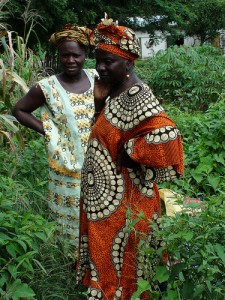The Seattle-based organization, New Course, doesn’t focus on what is right or wrong about past efforts in environmental conservation, says co-founder Jamie Bechtel. It focuses on impact. “When we start talking about a more holistic approach, one that includes farmers and specifically women, there is usually a light bulb moment,” she says. “Most of the time people just don’t realize that women have been excluded and that {working with} women is often where the impact is made.”
 Focusing on women can help address important issues ranging from hunger, gender equity, and climate change. (Photo credit: Bernard Pollack)
Focusing on women can help address important issues ranging from hunger, gender equity, and climate change. (Photo credit: Bernard Pollack)Jamie and her husband, Karl Morrison, founded New Course just one year ago after many years of working in environmental conservation. Their experience, explains Jamie, showed them that often it is usually women who provide food, haul water, and collect fuel and other natural resources for households. Yet, most conservation projects unintentionally exclude women, rather than helping them to become stewards of these resources.
“We realized that very often in conservation work, we weren’t even talking to women,” said Jamie. “But once we started to look at the role of women in health and natural resource management, we realized that this was an effective way to not only go about addressing those issues but to also address other issues like hunger and gender equity.” The couple decided to put their network of contacts to good use by building productive partnerships between on the ground conservation projects and funders interested in ensuring women are included in agricultural and environmental development.
A recent trip to visit the organization’s first project in Tanzania, a partnership between the Tanzanian Forest Conservation Group(TFCG) and a group of private funders from the United States “really validated what believe needs to be a change in the conservation community,” said Jamie.
Deforestation—because of agriculture and fuel needs—is not only devastating local wildlife, it is also leading to less rainfall in some parts of Eastern Africa. TFCG, an organization Karl had worked with in the past, was already working with farmers in Tanzania to help modify farming practices to prevent deforestation. New Course stepped in with some interested funders to help develop a program that better involved local women.
They started out by just talking with farmers, says Jamie. “And we found that they already recognized the problem. They were saying, ‘when we cut down the trees we have less water, but we need the space to farm.’ They didn’t need to learn that. They already knew it.”
The farmers and TFCG already had the solution, but New Course could help with funding and project structure. Now TFCG has the resources to provide training in participatory management and integrated farming practices that help farmers engage in reforestation. This not only improves their harvest but also helps repair damage to the surrounding forest which will also lead to more rainfall.
New Course will monitor the project over the long term and make sure the goals of gender equity and inclusion are met. And the success of this project will create more confidence in other potential funders, allowing for the support of more projects. It is already in talks with to start similar programs in Madagascar, the Democratic Republic of the Congo, Senegal, and Botswana.
“We want people to take a look at what we’ve done, see what they like, and take a chunk of that puzzle to fund,” said Jamie. “It’s about women and it’s about impact. We are able to provide that connection to people to show them that really it’s all the same thing.”

Danielle Nierenberg, an expert on livestock and sustainability, currently serves as Project Director of State of World 2011 for the Worldwatch Institute, a Washington, DC-based environmental think tank. Her knowledge of factory farming and its global spread and sustainable agriculture has been cited widely in the New York Times Magazine, the International Herald Tribune, the Washington Post, and
other publications.
Danielle worked for two years as a Peace Corps volunteer in the Dominican Republic. She is currently traveling across Africa looking at innovations that are working to alleviate hunger and poverty and blogging everyday at Worldwatch Institute’s Nourishing the Planet. She has a regular column with the Mail & Guardian, the Kansas City Star, and the Huffington Post and her writing was been featured in newspapers across Africa including the Cape Town Argus, the Zambia Daily Mail, Coast Week (Kenya), and other African publications. She holds an M.S. in agriculture, food, and environment from Tufts University and a B.A. in environmental policy from Monmouth College.








